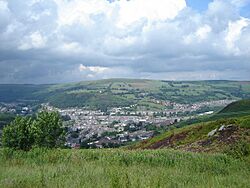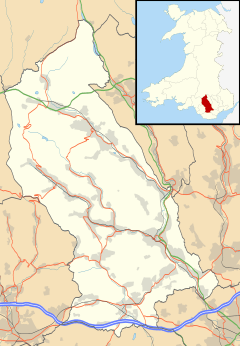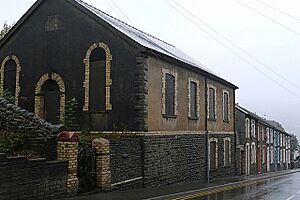Cymmer, Rhondda Cynon Taf facts for kids
Quick facts for kids Cymmer
|
|
|---|---|
 |
|
| Population | 4,807 (2011) |
| OS grid reference | ST0290 |
| Principal area |
|
| Ceremonial county | |
| Country | Wales |
| Sovereign state | United Kingdom |
| Post town | PORTH |
| Postcode district | CF39 |
| Dialling code | 01443 |
| Police | South Wales |
| Fire | South Wales |
| Ambulance | Welsh |
| EU Parliament | Wales |
| UK Parliament |
|
| Welsh Assembly |
|
Cymmer (which means 'the meeting point' in Welsh) is a village in the Rhondda Valley, Wales. It got its name because it's where two rivers, the Rhondda Fawr and Rhondda Fach, join together. In the mid-1800s, several coal mines opened here. Sadly, a terrible coal mine disaster happened in 1856, killing 114 people. The families of the miners did not receive any money to help them, which caused a lot of sadness in the community.
Contents
Where is Cymmer Located?
Cymmer is found in the lower part of the Rhondda Valley. It's about halfway between the towns of Treorchy and Pontypridd. The village is right on the A4119 road, not far from where it meets the A4058 road.
Nearby places include Penygraig, Trealaw, Tonypandy, Dinas Rhondda, Llwyncelyn, and Porth. Cymmer itself includes smaller areas like Trehafod, Trebanog, Britannia, Glynfach, and Cymmer village.
Cymmer's Past
In the 1800s, coal mining became very important in Cymmer. George Insole and his son James Harvey Insole owned the rights to dig for coal in the area. Many coal mines were opened, such as Cymmer Colliery (Old No. 1 Pit) in 1847, Glynfach Colliery in 1851, and New Cymmer Colliery in 1855.
The 1856 Mining Disaster
In 1856, a terrible accident happened at the Old Pit mine. An explosion killed 114 men and boys. An investigation found that there wasn't enough fresh air in the mine. This caused dangerous gas to build up, which caught fire from open flames used by the miners.
The people in charge of the mine were questioned. However, at a trial in 1857, no one was found responsible for the deaths. This made the community very upset, and those sad feelings lasted for many years. The families of the miners who died never received any financial help.
Famous People from Cymmer
The well-known writer and broadcaster Gwyn Thomas (1913–1981) was born and grew up in Cymmer.
How Cymmer is Governed
Before 1889, local areas like Cymmer were managed by unelected officials called magistrates. These were often wealthy landowners. In 1889, a new law meant that people could elect their own representatives.
From 1889 to 1974, Cymmer elected one councillor to the Glamorgan County Council. This council was later replaced in 1974 by the Mid Glamorgan County Council.
Today, Cymmer is part of the Rhondda Cynon Taf County Borough Council. This council was created in 1996. The area around Cymmer, including Trehafod, had a population of 5,505 people in 2011. Since 2022, the local area is officially called 'Cymer' for elections.
The Cymmer area has always elected two councillors from the Welsh Labour party since 1995. This continued in May 2022, when Gareth Caple and Ryan Evans were elected.
Places of Worship
Cymmer Independent Chapel is thought to be the first nonconformist chapel in the Rhondda Valley. It was built in 1743 and had links to the religious leader Howel Harris. It was a very important church for all the Congregational chapels in the valley.
In 1856, 48 victims of the Cymmer Colliery disaster were buried in the chapel's graveyard. The chapel building from 1834 is still there, but it's in poor condition. Sadly, most of the graveyard was removed in 2005 to make way for road construction. A new chapel opened in 1908, but it was sold in the 1960s and is now used for businesses.
St John's Church was built between 1888 and 1889. It stands on the hillside above the older part of Cymmer village, which was centered around the Cymmer Chapel.
Schools in Cymmer
In the early 2000s, Cymmer had three schools: Cymmer Infants School, Cymmer Junior School, and Ysgol Gyfun Cymer Rhondda (a secondary school).
However, in 2015, the infants and junior schools joined together. They formed a new community primary school. This new school uses the same buildings and land as the old schools.
 | Delilah Pierce |
 | Gordon Parks |
 | Augusta Savage |
 | Charles Ethan Porter |



